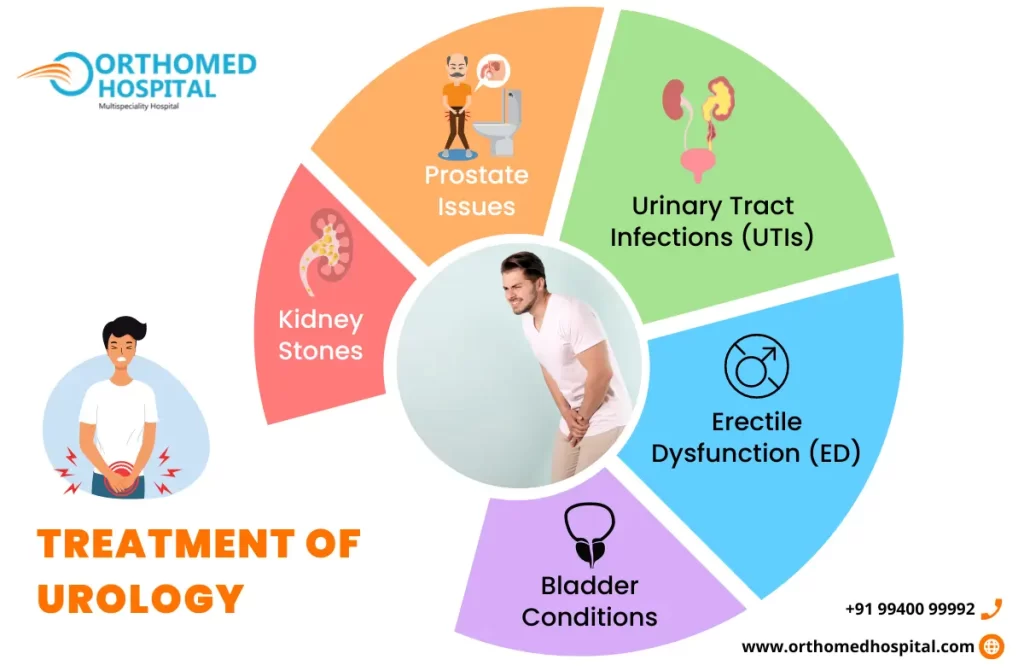Urologists are specialized medical professionals who diagnose, treat, and manage disorders and conditions related to the urinary tract and the male reproductive system. The expertise of the best urologist in Chennai encompasses a wide range of conditions that affect these systems, making them an essential part of maintaining urological health.
In this overview, we will delve into the various conditions the best urology doctor in Chennai treats, when to approach them, the diagnostic tests they utilize, common procedures performed, along the significance of their role in healthcare.

Conditions Treated by the Best Urologist in Chennai
The best urologist in Chennai addresses a diverse array of conditions that usually affect the urinary tract and male reproductive system. These include but are not limited to:
- Urinary Tract Infections (UTIs): Common infections that affect the bladder, urethra, or kidneys, causing symptoms like painful urination and lower abdominal discomfort.
- Kidney Stones: Hard mineral deposits that form in the kidneys and may cause severe pain as they move through the urinary tract.
- Prostate Disorders: Conditions that involve the prostate gland, such as benign prostatic hyperplasia (BPH) and prostate cancer.
- Bladder Issues: Including bladder infections, interstitial cystitis, and bladder cancer.
- Male Infertility: The best urologist in Chennai can diagnose and treat underlying causes of male infertility, including issues with sperm production, transportation, or erectile dysfunction.
- Erectile Dysfunction: Difficulty achieving or maintaining an erection, often due to medical or psychological factors.
- Urological Cancers: The best urology doctor in Chennai diagnoses and treats cancers of the kidneys, prostate, testicles, bladder, and other related areas.
- Incontinence: Involuntary leakage of urine, which can result from various underlying conditions.
When to Approach a Urologist?
It’s important to consult the best urologist in Chennai when experiencing symptoms or conditions related to the urinary tract or male reproductive system.
1. Painful Urination: This could indicate a urinary tract infection, kidney stones, or other issues.
2. Blood in Urine: Also known as hematuria, this may indicate a range of conditions including bladder or kidney cancer.
3. Changes in Urinary Habits: Frequent urination, urgency, or difficulty starting or stopping urine flow.
4. Prostate Issues: Men over the age of 50 should consider regular prostate health check-ups with the best urology doctor in Chennai.
5. Male Infertility: Couples experiencing difficulty conceiving should consider consulting the urology specialist in Chennai.
6. Unexplained Genital Pain or Discomfort: This could be a sign of various underlying issues.
7. Erectile Dysfunction: Especially if it’s persistent and impacting quality of life.
Diagnostic Tests Used
The urology specialist in Chennai employs several diagnostic tools to accurately identify and understand urological conditions. These may include:
- Urinalysis: Examining a urine sample to identify signs of infection, kidney problems, or other abnormalities.
- Imaging Studies: X-rays, ultrasounds, CT scans, and MRIs help visualize the urinary tract and reproductive organs.
- Cystoscopy: A thin tube with a camera is inserted by the best urologist in Chennai into the urethra to inspect the bladder and urethra’s interior.
- Biopsy: Tissue samples may be taken from the prostate, bladder, or other areas to diagnose cancer or other conditions.
Common Urological Procedures
The best urologist in Chennai performs a range of procedures to treat various conditions. Some common ones include:
- Lithotripsy: Non-invasive procedure that uses shock waves to break down kidney stones into smaller fragments for easier passage.
- Prostatectomy: Surgical removal of part or all of the prostate gland, often performed to treat prostate cancer.
- Cystectomy: Surgical removal of all or part of the bladder, often used to treat bladder cancer.
- Vasectomy: The urology specialist in Chennai performs the male sterilization procedure that involves cutting or blocking the vas deferens to prevent sperm from reaching the semen.
- Incontinence Procedures: Various surgeries and therapies to manage urinary incontinence.
- Penile Implant Surgery: For individuals with severe erectile dysfunction, implants can restore sexual function.
Conclusion
To conclude, the best urologist in Chennai plays a vital role in maintaining urological health, addressing a wide range of conditions that affect the urinary tract and male reproductive system. Recognizing the symptoms, knowing when to approach a urologist, and participating in regular check-ups provided by the experts at the Orthomed Hospital can lead to early detection and effective management of urological conditions, contributing to long-term health and happiness.
Read also Best Pulmonologist in Chennai.


